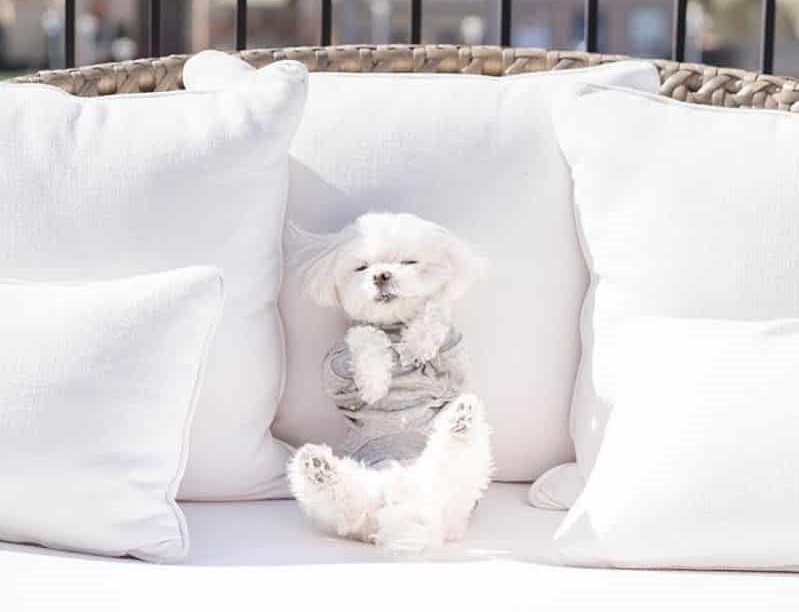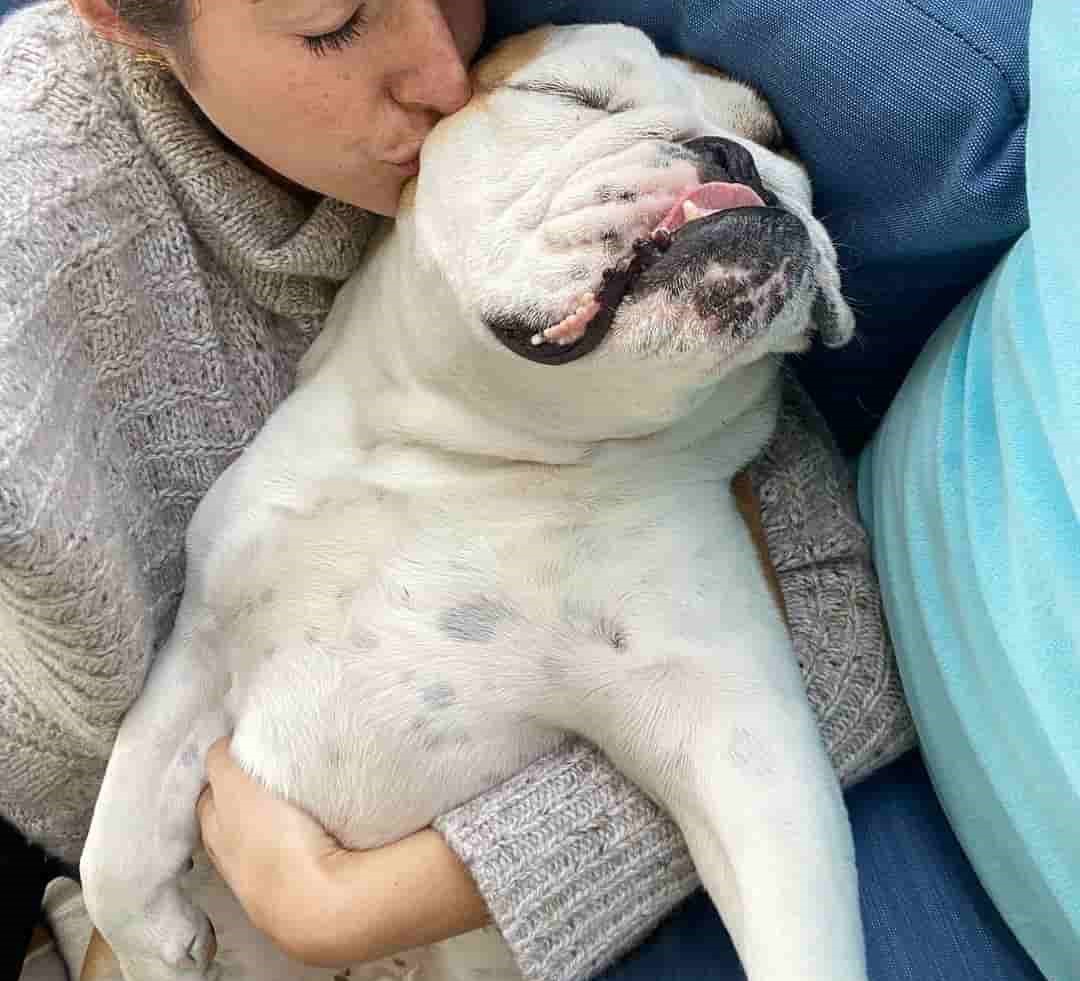Ever snuggled into bed only to find your furry friend nestling close, making you ponder, “Why does my dog sleep against me?”
Me too. In fact, my pup snuggles up against me while we sleep EVER night!
In this guide, we’ll venture into the depths of canine behavior, uncovering the heartwarming and multifaceted reasons behind this endearing gesture.
So, fetch your curiosity, and let’s embark on this enlightening journey together.
Table of Contents
Reasons Why Dogs Enjoy Sleeping Against Their Owners
Our furry companions have many reasons for sleeping so close, each revealing a layer of their complex emotional and behavioral tapestry.
Emotional Bond
At the heart of it, dogs are deeply emotional creatures. Their decision to sleep nestled against you often mirrors the depth of the bond they feel. Every time your pet cozies up, it’s like them whispering, “I trust you, and I cherish our bond.”
Security and Comfort

The world can be a big, daunting place for your four-legged friend. Your presence offers them a shield against potential threats and uncertainties. For them, you are a beacon of safety, a comforting constant in an ever-changing environment.
Pack Mentality and Instinctual Behaviors
Delving into their wild ancestry, dogs are descendants of pack animals. In a pack, proximity often means security. So, when your dog sidles up against you, it’s a nod to their instinctual need for pack closeness.
Temperature Regulation
Quite practically, dogs seek warmth during colder nights, and you, dear human, are a toasty radiator. On the flip side, your dog’s body heat can also offer you cozy warmth on those chilly winter nights.
Scent and Familiarity
To a dog, you smell like home. Your unique scent is comforting and familiar, a sensory reminder that they’re in their safe space.
Attachment and Dependency
Some dogs, especially those that have been with their owners since puppyhood, develop a keen sense of attachment. This dependency often translates into physical closeness during sleep.
Separation Anxiety
For dogs that struggle with anxiety when apart from their owners, sleeping against you is a soothing act. It alleviates their fears and reassures them of your presence.
Communication and Attention
Sometimes, it’s simply a way of getting your attention. A subtle nudge or a full-on sprawl across you can be their way of saying, “Hey, I’m here, and I wouldn’t mind a midnight cuddle.”
Health Benefits
Recent studies suggest that sharing a bed can boost the dog’s and the owner’s oxytocin levels. This “cuddle hormone” promotes bonding and has several health benefits, from reducing stress to lowering blood pressure.
So, the next time you wonder, ‘Why does my dog sleep against me?’ remember that it’s often a beautiful expression of the bond between you and your dog.
Sleeping Habits and Behaviors of Dogs
Dogs, much like their human companions, possess diverse sleeping habits. From the adorable twitch of their paws during dream-filled REM cycles to their preference for curling versus sprawling, each behavior offers a glimpse into their well-being and state of mind.
Puppies might nap frequently, recharging for their next play spree, while seniors seek longer, uninterrupted rest. Observing these habits deepens our bond with our pets and ensures we’re attuned to any changes signaling health or emotional shifts.
Can Some Dog Breeds Display More Affectionate Behavior?
Indeed, while each dog is a unique blend of personality and quirks, certain breeds are genetically predisposed to be more affectionate. Their inherent characteristics make them particularly drawn to human interaction and closeness:
- Labrador Retrievers: Often hailed as the world’s most friendly breed, Labs thrive on human companionship and are always up for a good cuddle.
- Golden Retrievers: Like Labs, their gentle and loving nature makes them perfect snuggle buddies.
- Cavalier King Charles Spaniels: These little lap dogs have a rich history of being companion animals, and their penchant for cuddling is legendary.
- Bichon Frise: With their fluffy coats and cheerful demeanor, they are often found seeking affection from their human pals.
- Boxers: Despite their robust appearance, Boxers are often described as “forever puppies” due to their playful and affectionate nature.
- Shih Tzus: Originally bred to warm the laps of Chinese royalty, they still enjoy their role as affectionate companions today.
Conversely, breeds like the Shiba Inu, Basenji, or Alaskan Malamute might exhibit a more independent streak, though exceptions abound. Regardless of the breed, individual personality and upbringing play a significant role in determining their level of affection.
Potential Risks and Dangers of Sleeping Next to Your Dog

While the appeal of sharing a bed with your furry friend is undeniable, it’s prudent to recognize the potential risks involved:
Injury
Accidental pushes or a dog stretching out can cause unintentional harm, especially with larger breeds or in confined spaces.
Allergies
Extended close contact can exacerbate allergies in sensitive individuals, leading to sneezing, congestion, or more severe allergic reactions.
Sleep Disturbances
A dog’s nocturnal activities, such as twitching, barking, or frequent position changes, might interrupt your sleep cycle, leaving you groggy the next day.
Hygiene Concerns
Despite regular grooming, dogs can carry dirt, pollen, or other allergens into the bed, potentially impacting cleanliness.
Aggression or Resource Guarding
Even the most loving pet might occasionally guard their sleeping space or react aggressively if disturbed during deep sleep.
Sleep Disorders or Behavioral Issues
Changes in a dog’s usual sleeping patterns might indicate underlying health concerns. Sharing a bed could obscure these changes or even exacerbate certain conditions.
Overheating or Uncomfortable Sleeping Conditions
Dogs, especially those with thick coats, can become heat sources. This might lead to discomfort or overheating for both the pet and the owner.
Incorporating vigilance and awareness can help navigate these concerns, ensuring both you and your pet get the restful sleep you deserve.
Conclusion
Delving into the reasons dogs snuggle up at night reveals a blend of instinct, emotion, and pure companionship. While understanding these reasons deepens our bond, being mindful of potential risks ensures mutual comfort.
Ultimately, our furry friends’ bed-sharing habits underscore the unique and unbreakable bond between a dog and its owner. Whether they cuddle for warmth, security, or sheer affection, it’s clear why many ask, “Why does my dog sleep against me?” The answer lies in the deep connection we share.
FAQs
Is it healthy for dogs to sleep in bed with their owners?
While sleeping with dogs can offer emotional benefits and warmth, one must be aware of potential risks like allergies, sleep disturbances, and hygiene concerns.
Do dogs have a favorite person to sleep with?
Dogs may gravitate towards a particular family member due to a deeper bond, consistent interaction, or even the person’s habits during sleep.
How can I train my dog to sleep in its bed?
Positive reinforcement, like treats and praise, can encourage your dog to favor their bed. Consistency and establishing a bedtime routine are also key.
Why is my dog sleeping next to me?
It’s a sign of love and affection. Also, your dog sleeps next to you because they trust you and feel secure and comfortable with you.

